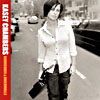
This Week: Kasey Chambers breakout, Uncle Tupelo's best of, and a lost classic from British hillbillies.
Kasey Chambers
Barricades & Brickwalls (Warner Bros.)
This is supposed to be the big breakout for Aussie alt-country sassy lass Kasey Chambers. Her first album, 2000's The Captain, established her as an up-and-comer on these shores (she was already a star at home and in Europe). She got credibility boosts from the likes of Steve Earle and Lucinda Williams (Lucinda makes an appearance on Barricades, along with Buddy Miller and Paul Kelly). Her frazzled brunette bangs and pierced lower lip have graced the pages of everything from No Depression to Vanity Fair.

So does she deliver? Yes, she mostly does. As on The Captain, Chambers wrote almost everything here (the honorable exception being a swinging cover of Gram Parsons' "Still Feeling Blue"). She's got a heck of a way with a hook, from the guitar-rock stomp of the title track to the aching "Not Pretty Enough" to the rowdy honky-tonk of "A Little Bit Lonesome." She's more passionate than articulate, which is why the personal statements (she invites the world to "kiss my ass" and "stick it where the sun don't shine," and warns, "I'll be damned if you're not my man before the sun goes down") register more than the philosophical ones ("We don't talk to our neighbors/ They've got funny colored skin" is as deep as it gets).
Even on the more pedestrian tracks, Chambers can rely on her greatest asset: her seductive, ringing voice. She can be simultaneously sweet and salty, soft and sharp. She's not someone you wanna mess with. Or yeah, actually, she is.
—Jesse Fox Mayshark
Uncle Tupelo
89/93: An Anthology (Columbia)
The Mekons
Fear and Whiskey (Quarterstick)
From all the attention that Uncle Tupelo gets, it's easy to get the impression that the band invented alt-country. Alt-country's bi-monthly bible, No Depression, takes its name from the group's first album, named for their recording of the Carter Family classic. And since Tupelo's break-up in '94, they've enjoyed legendary status in the roots-rock movement.
Perhaps trying to cash in on this notion, Columbia is releasing a best-of collection, 89/93: An Anthology. The CD makes clear that while Uncle Tupelo created competent, occasionally inspired country-flavored rock, it owes its legacy to timing, as much as talent. Rock and country have so much in common that crossovers are inevitable.
The group recorded four albums, the first of which, No Depression, was released in 1990. Jay Farrar (who went on to form Son Volt and recently released his first solo album) and Jeff Tweedy (who later formed Wilco) traded songwriting and lead vocal duties. Anthology kicks off with "No Depression," and the group nails the tune, giving it a rocking, almost apathetic jubilance (something the Carter family, living through the real Depression, never could muster in their chilling version). Farrar's voice is arresting. He sang with a weariness and hardworn wisdom that belied his twenty-something years. But after repeated listens, you start to realize Farrar's songs are all atmosphere, no substance. He tells you how he feels, but rarely do we get any details to make us empathize, or even believe in his pain. "Persuaded, paraded, inebriated in doubt/still aware of everything life carries on without," he laments over a steel guitar on "Whiskey Bottle." It's a self-pity that wears thin.
Tweedy started out as more of a sideman to Farrar, but he ended up surpassing him as a songwriter. And although his voice is an inferior instrument, he packs more passion and punch into it—even the cracked and broken notes ring true. Songs like "Black Eye" and "We've Been Had" prove Tweedy learned something from all those old folk and country ballads.
Still, Tweedy's best work came after Uncle Tupelo called it quits. Anthology is a good sampler for any newcomers, but aside from a previously unreleased cover of the Stooges' "I Wanna Be Your Dog," there's not much here for fans.
Uncle Tupelo certainly wasn't the first band to marry country and roots music to rock and punk—the Byrds, the Flying Burrito Brothers, Green on Red, the Cowboy Junkies, Steve Earle and many others treaded similar territory before them.

The weirdest and perhaps most endearing effort came from the Mekons. A punk group that formed in Leeds, England in the '70s, the Mekons took a hiatus in the early '80s. They reemerged in 1985 with Fear and Whiskey, an inspiring blend of country and punk, which has just been reissued by Quarterstick Records. While Uncle Tupelo approached its music with reverence for traditional country, these Brits don't try to sound authentic or "true" to their roots. They pick and choose and steal what they want and disregard what they don't or can't play. The result is something that sounds completely unique but has as much heart and rawness as any Hank Williams song.
Jon Langford and Tom Greenhalgh sing over beautifully sloppy guitarwork and a wistful fiddle that resonate with the disillusionment that became the group's mantra. "Searching for resistance in my red red wine/ It's hard to be human again," Greenhalgh sings.
It's another case of the Brits reflecting our culture back at us and making it sound fresh again. The recording stands as a classic.
—Joe Tarr

February 28, 2002 * Vol. 12, No. 9
© 2002 Metro Pulse
|